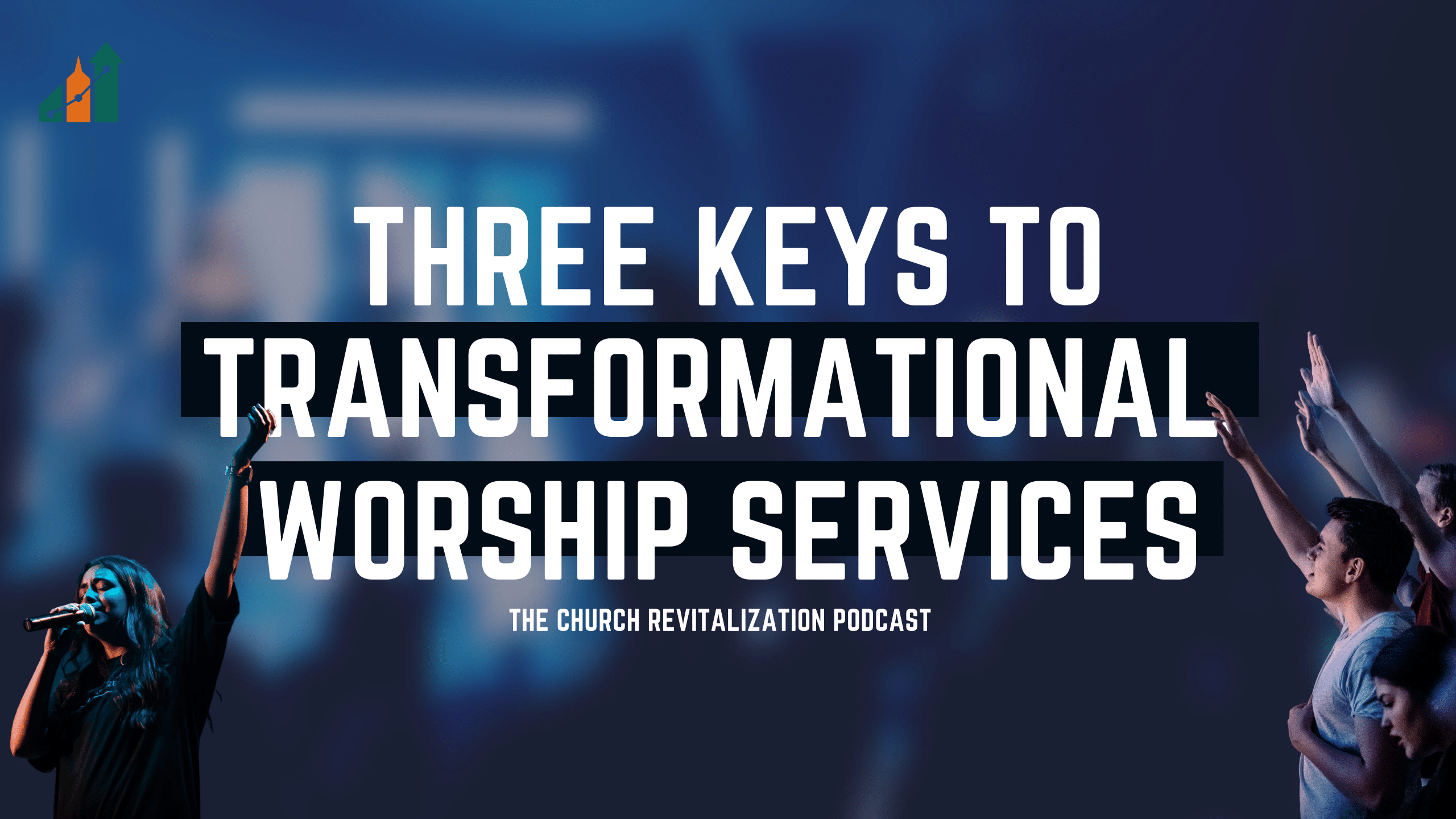The Church Revitalization Podcast – Episode 124
3 Keys to Leading Transformational Worship Services at Your Church
Have you ever felt like your worship services were stuck in a rut? The Sunday-to-Sunday hamster wheel is a grind, and it’s easy to go on autopilot. But simply floating from week-to-week, doing the minimum to make Sunday happen, is a far reach from what you intended when you first got into ministry.
First, it’s important to remember why your church has worship services in the first place.
What function does the worship service fulfill? What are you hoping to accomplish? In our Strategic Envisioning process, we discuss the specific discipleship outcomes that a church wants to see from its worship service. It varies slightly from one church to the next, but generally, the goals are to lead people to worship, study Scripture, and to preach the Good News about Jesus.
What is Worship?
These goals sound simple enough. But what does it really mean to lead someone to worship? Does it mean getting them to sing songs for a few minutes each week? Or is it bigger than that? In Romans 12, Paul describes offering our lives as a living sacrifice is the true definition of spiritual worship. You can probe for deeper meaning on any other discipleship outcomes you identify–such as defining success in inspiring others to study and know God’s Word.
Personally, I like to distill the purpose of a worship service into a simple sentence: to lead people to live in awe and obedience to God. Worship requires being in awe of God–we are to fear Him, praise Him, adore Him. Worship requires obedience–being doers of the Word. Our worship must move from a feeling of awe to an act of obedience.
If you were to use my statements above as the metric for success, how would your church be doing? Are your worship services meeting that standard?
If not, you’re reading the right article. There are three keys to leading transformational worship service that empower people to live in awe and obedience to Jesus.
Subscribe below to never miss an episode.
Master the Environment
The central question, as it relates to your environment, is how do you want people to feel when they come to worship?
If you’ve ever been to an old Cathedral in Europe, you can appreciate the power of mastering the environment. When you walk into the sanctuary, your eyes are inevitably drawn upward. The ribbed vaulting in the nave creates criss-cross patterns that command your attention to the heavens. Beautiful stained glass windows tell a story and inspire the imagination. The contrast between cool stone and vibrant colors blend to create a feeling of holiness and grandeur.
This isn’t to suggest that every church should be in a cathedral. By no means! But the cathedral creates the environment that the medieval liturgists wanted worshippers to experience. It makes you feel the way that they designed it to make you feel.
Why do you think God gave such specific instructions for the Tabernacle? Physical space inspires spiritual focus. There is a connection between the physical and the metaphysical. God is not so small that He needed a specific house (or any house!), therefore the Tabernacle instructions were for our benefit–to create an environment that pointed the Israelites to deeper awe and obedience.
Start with the answer to the question: how do we want people to feel when they come to our campus (or join us online)? With that in hand, begin to ruthlessly eliminate any distraction from that feeling and identify any changes that could enhance your environment.
Be Intentional with the Experience
The key question to address for this step is: what do we want people to experience? While the environment is largely passive, the worship service is active. It’s important to think through every detail and how it’s communicated. When do people sit or stand? What do they sing, listen to, or respond to?
The worship service is more than any of its individual components. Church leaders sometimes think about each element (Communion, Offering, Message, Music, etc.) in isolation and plan accordingly. The tech team does their work. The praise team or musicians do their part. The pastor prepares the sermon. The ending result is a layered trifle of mismatched moments.
Instead begin to think of the worship service as a unified whole. How can each element reinforce the main point. Undoubtedly, this kind of integration and intentionality requires planning. It’s not possible to craft meaningful worship services if you’re throwing it together at the last minute from week to week. Create a planning rhythm that enables you to be intentional.
Clarify the Message
The key question here is: What do you want people to remember? Most of us were taught in homiletics that we should have three points of application–if you’re Baptist, they should all start with the same letter. Jests aside, most preachers are convinced that the more sophisticated their messages are, the better they are. This is false.
You should have one clear point that the most immature believer in your congregation can grasp. This point should be so overpoweringly obvious that it would be impossible for them to forget.
To be certain, you can have supplemental points. And a truly skilled preacher knows how to layer levels of complexity for those that are longing for meat without drifting from the simplicity of the core point. It is claimed that Abraham Lincoln once said, “I have no time to prepare five-minute speeches, but that I can go and speak an hour at any time.” Saying a lot is easy; distilling complexity into simplicity is difficult.
If you want to have a transformational worship service, you must have quality preaching that has a memorable, actionable message.
Leading a church is exhausting. Even getting Sunday mornings together can be a drain on your time and emotions. But God has blessed us with the opportunity to lead others to live in awe and obedience to God. It is our joy and responsibility to do our best and invest the energy it deserves.
These three keys to leading a transformational worship service can unlock a new level of effectiveness for your church, regardless of your size, budget, or facility.
BONUS: Get a free Team Discussion Guide in the video description on YouTube.


Scott Ball is the Vice President and a Lead Guide with The Malphurs Group. He lives in East Tennessee with his wife and two children. (Email Scott).

